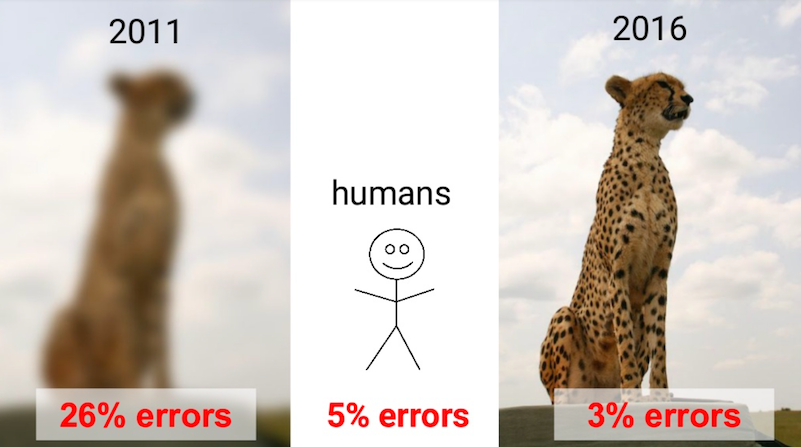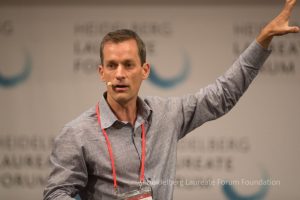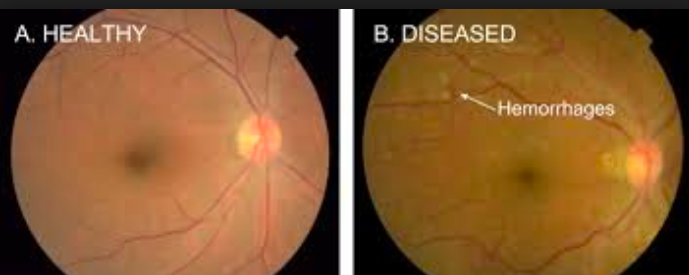 EMERGING TECH
EMERGING TECH
 EMERGING TECH
EMERGING TECH
 EMERGING TECH
EMERGING TECH
Just five years ago, artificial intelligence-enabled computers could barely recognize images fed to them, much less analyze them anything like people can. Suddenly, they’ve turned the tables.
“In 2011 their error rate was 26 percent,” says Jeff Dean, chief of the Google Brain project, which along with other tech giants has helped lead a recent revolution in image recognition as well as speech recognition and self-driving cars. Now, he says, computers’ ability to view and analyze images (pictured) exceeds what human eyes can do.
“If you’d have told me that would be a possible just a few years ago, I would’ve never believed you,” Dean said during an appearance at a research event in Heidelberg, Germany. But thanks to AI-enabled computer vision advances, computers “can now see … and that has opened our eyes (about) what is possible.”
AI and machine learning possibilities were a big theme this week at the 5th Heidelberg Laureate Forum, or HLF 2017. The annual event blends the world’s most promising young science researchers with veteran computer scientists and mathematicians who have won the highest honors in their fields, namely the ACM Prize in Computing, the Turing Prize, the Field’s Medal, the Abel Prize and the Nevanlinna Award.

Google Brain chief Jeff Dean (Photo: Bernhard Kreutzer for the Heidelberg Laureate Forum)
Dean, a 2012 ACM Prize in Computing winner for his work in distributed systems and a legend at Google, gave a deep-dive roundup of how AI-enabled technologies are already improving healthcare and medical research outcomes.
It makes sense that they’re getting applied there. The AI-enabled healthcare sector is set to grow at an annual rate of about 40 percent through 2021, when it is expected to hit $6.6 billion, according to a recent Accenture report. Currently, it’s hovering around $600 million.
Dean outlined a range of AI medical news at the HLF this week:
Pathologists are charged with reading the slides and tests that detect breast, prostate and other cancers. But despite their training, research shows that multiple pathologists can only agree on some breast cancer diagnoses about 42 percent of the time.
A deep learning project using Google LLC’s off-the-shelf Inception deep learning tool and some customization at Cornell University showed significantly better results, Dean said.
Released in March 2017, the study explains that Google Brain’s ongoing AI medical research group trained computers to detect cancer by feeding it hundreds of pathology images and reached accuracy levels nearing 90 percent.
Two months ago, a Swedish study emerged that showed similarly encouraging results with AI-enabled diagnosis bone fractures in X-Rays.
Here, researchers at Sweden’s Karolinska Institutet, Royal Institute of Technology and Danderyd Hospital found that deep learning-powered computer vision could find fractures with the same accuracy as orthopedists do. Karolinska’s Max Gordon, who led the study, wrote that this proves AI networks can make assessments on a par with human specialists, and we hope that we’ll be able to achieve even better results with high-res X-ray images.”
Referring to that work, Dean said: “Computer vision and AI technology is about to fundamentally change” medical diagnoses. This can impact patients almost immediately, he said.
A great example of this: diabetic retinopathy. Caught early, it’s exceedingly treatable. But if you miss it, it can lead to vision loss and even blindness. And 400 million people are at risk for the disease worldwide, according to the Centers for Disease Control in Atlanta.
Problem is, it’s notoriously difficult for even trained ophthalmologist to diagnose, studies have shown. “If you ask two board-certified ophthalmologists to look at images of healthy and (DR-affected) eyes (see image below) four times, they agree 60 percent of the time. Two hours later, they agree 65 percent of the time.”

Comparing images to diagnose diabetic retinopathy (Image: Google)
“It’s frightening,” Dean added, and it made for a natural AI challenge. “If these new computer vision systems can reach human-level accuracy in telling the difference between a dog or a cat, they should be (useful) in identifying” a broad array of medical issues.
Researchers fed an AI system 150,000 eye images and, in the end, got the AI software to exceed human accuracy levels in diagnosis, the research showed.
There’s a long list of other possible applications for AI computers in healthcare. From drug discovery to overall patient care to mapping the synaptic connections in the human brain, AI soon appears likely transform healthcare and medical treatment for millions, Dean said. And Google’s not the only one in the game. The Watson team at IBM Corp. and AI researchers from Microsoft Corp. to Facebook Inc. are similarly working on AI health algorithms and solutions.
A number of tech leaders such as Tesla Inc. Chief Executive Elon Musk have expressed worries that AI could get out of control and threaten humans. That debate seems likely to rage on at least until the Singularity arrives. But for those more concerned about well-being now, the message Dean delivered this week is decidedly more hopeful.
Gina Smith, Ph.D., is an award-winning tech journalist and the New York Times bestselling author of Steve Wozniak’s biography, “iWOZ: How I Invented the Personal Computer and Had Fun Doing It” (2006/2014, W.W. Norton) and “The Genomics Age: Why DNA Technology Changes Everything” (2005/2011, Amacom), a Barron’s Book of the Year. Follow Gina on Twitter @ginasmith888.
Support our mission to keep content open and free by engaging with theCUBE community. Join theCUBE’s Alumni Trust Network, where technology leaders connect, share intelligence and create opportunities.
Founded by tech visionaries John Furrier and Dave Vellante, SiliconANGLE Media has built a dynamic ecosystem of industry-leading digital media brands that reach 15+ million elite tech professionals. Our new proprietary theCUBE AI Video Cloud is breaking ground in audience interaction, leveraging theCUBEai.com neural network to help technology companies make data-driven decisions and stay at the forefront of industry conversations.